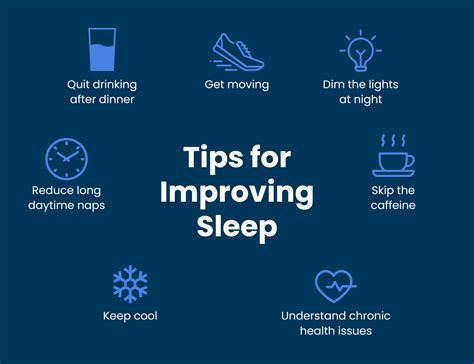Sleep, an essential aspect of our daily routine, involves more than just closing our eyes and resting. It is a time when our body repairs and rejuvenates itself, allowing us to wake up refreshed and ready to face the challenges of a new day. However, in today's fast-paced world, achieving quality sleep can often be a challenge.
Fortunately, there are various ways to naturally enhance the quality of your sleep without relying on artificial aids or medications. By incorporating simple yet effective techniques into your bedtime routine, you can optimize your sleep patterns and experience a more restful night's rest.
One fundamental aspect to consider is the environment in which you sleep. Creating a peaceful and comfortable sleep environment is crucial for facilitating deep and uninterrupted sleep. Taking the time to prioritize a conducive sleeping environment can make a remarkable difference in the quality of sleep you experience each night.
The importance of establishing a consistent sleep schedule cannot be emphasized enough. Our body's internal clock, also known as the circadian rhythm, thrives on routine. By going to bed and waking up at the same time each day, even on weekends, you can regulate your body's internal clock and promote a healthy sleep-wake cycle.
To maximize the benefits of your sleep, it is essential to engage in regular physical activity. Being physically active during the day can help reduce stress and anxiety, which are common barriers to getting a good night's sleep. However, it is important to avoid vigorous exercise close to bedtime, as it can stimulate your body and make it difficult to fall asleep.
Another crucial element for enhancing sleep quality is managing your screen time, especially before bed. The blue light emitted by electronic devices such as smartphones and tablets can disrupt your body's natural sleep patterns and inhibit the production of melatonin, the hormone responsible for regulating sleep. To promote better sleep, it is advisable to limit your exposure to screens at least one hour before bedtime.
Implementing relaxation techniques before bed can also prove immensely beneficial for achieving optimal sleep. Practices such as deep breathing exercises, meditation, or gentle stretching can help relax your body and mind, reducing tension and promoting a calm state conducive to better sleep.
Finally, it is important to pay attention to your diet and eating habits, as they can significantly impact your sleep quality. Avoiding heavy meals, caffeine, and alcohol before bed can prevent discomfort and disruptions during the night. Additionally, incorporating sleep-promoting foods and beverages, such as herbal teas or a small serving of magnesium-rich foods, into your evening routine can further support restful sleep.
By incorporating these natural techniques into your bedtime routine, you can take proactive steps towards improving the quality of your sleep. Prioritizing a peaceful sleep environment, establishing a consistent sleep schedule, engaging in regular physical activity, managing screen time, practicing relaxation techniques, and adopting a sleep-friendly diet are all simple yet effective ways to promote deep, restorative sleep naturally.
Enhancing Your Natural Sleep Pattern: 7 Strategies for Better Rest

Discover effective techniques to optimize your body's inherent rhythm and improve the quality of your sleep through natural means. By incorporating these strategies into your daily routine, you can cultivate healthy sleep patterns and experience rejuvenating rest.
Establish a Consistent Sleep Schedule
Creating a regular sleep routine is crucial for enhancing the quality of your sleep naturally. A consistent sleep schedule helps regulate your internal body clock and promotes a more balanced sleep-wake cycle.
By adhering to a fixed bedtime and wake-up time, you train your body to anticipate sleep at a specific time each night and wake up refreshed at a targeted time each morning. This regularity helps synchronize your body's natural sleep-wake rhythm, making it easier to fall asleep and wake up naturally.
- Set a consistent bedtime and wake-up time
- Avoid altering your sleep schedule on weekends or holidays
- Establish pre-sleep rituals to relax your mind and body
- Avoid stimulating activities, such as electronic device usage before bed
- Create a comfortable sleep environment that promotes restorative rest
- Avoid napping during the day, especially close to bedtime
- Stick to your sleep schedule, even on days with disrupted sleep
Consistency is key when it comes to improving your sleep quality naturally. By establishing a regular sleep schedule, you can optimize your body's internal clock, promote better sleep, and wake up feeling refreshed and rejuvenated each day.
Create a Relaxing Bedtime Routine

Establishing a calming bedtime routine can greatly contribute to improving the quality of your sleep naturally. By incorporating relaxing activities into your evening routine, you can signal to your body that it is time to unwind and prepare for a good night's rest. Here are some ideas to create a soothing routine that promotes a peaceful sleep:
1. Wind down with a warm bath or shower. Taking a leisurely bath or shower before bed can help relax your muscles and ease tension in your body. The warmth of the water can also have a soothing effect on your mind, making it easier to fall asleep. |
2. Engage in calming activities. Dedicate some time to activities that promote relaxation, such as reading a book, practicing gentle yoga or meditation, or indulging in a hobby that brings you joy. These activities can help shift your focus away from the stresses of the day and create a tranquil atmosphere before bed. |
3. Create a sleep-friendly environment. Ensure your bedroom is conducive to sleep by making it dark, cool, and quiet. Use curtains or blinds to block out external light, keep the temperature comfortable, and reduce noise distractions. Investing in a comfortable mattress, pillows, and bedding can also greatly enhance your sleep quality. |
4. Limit electronic devices before bed. The blue light emitted by electronic devices like smartphones, tablets, and televisions can suppress the production of melatonin, a hormone that regulates sleep. Avoid using these devices for at least an hour before bed to allow your body to naturally wind down. |
5. Practice relaxation techniques. Incorporating relaxation techniques into your bedtime routine can help calm your mind and prepare it for sleep. Deep breathing exercises, progressive muscle relaxation, and guided imagery are all effective methods to promote relaxation and improve sleep quality. |
6. Stick to a consistent sleep schedule. Establishing a regular sleep schedule can help regulate your body's internal clock and improve sleep quality. Try to go to bed and wake up at the same time every day, even on weekends, to maintain a consistent sleep routine. |
7. Avoid stimulating substances before bed. Limit or avoid consuming caffeine, nicotine, and alcohol close to bedtime. These substances can interfere with your sleep patterns and make it difficult to fall asleep or stay asleep throughout the night. |
By incorporating these simple tips into your bedtime routine, you can create a peaceful and relaxing atmosphere that promotes better sleep naturally. Experiment with different activities and find what works best for you to ensure a restful night's sleep.
Creating an Ideal Sleep Environment
Sleep is a vital aspect of maintaining good health and well-being. In order to optimize your sleep quality, it is important to pay attention to your sleep environment. Creating an ideal sleep environment can greatly contribute to getting a restful night's sleep.
- Keep your bedroom cool and well-ventilated. A moderate temperature, between 60 to 67 degrees Fahrenheit (15 to 19 degrees Celsius), promotes better sleep quality.
- Ensure that your bedroom is dark and quiet. Use thick curtains, blinds, or an eye mask to block out any unwanted light. Use earplugs or white noise machines to mask any disruptive sounds.
- Invest in a comfortable mattress and pillows that provide adequate support. The right bedding can greatly enhance your sleep experience.
- Remove electronic devices from your bedroom. The blue light emitted by screens can interfere with your sleep-wake cycle. Create a screen-free zone to promote relaxation and better sleep.
- Keep your bedroom clutter-free and organized. A clean and tidy space promotes a sense of calm and relaxation, making it easier to fall asleep and stay asleep.
- Create a bedtime routine that helps signal your body it's time to sleep. Activities such as reading a book, taking a warm bath, or practicing relaxation techniques can help prepare your mind and body for sleep.
- Avoid consuming caffeine or alcohol close to bedtime, as they can disrupt your sleep patterns. Opt for calming herbal teas or warm milk instead.
By optimizing your sleep environment, you can create the ideal conditions for a restful and rejuvenating sleep. Implement these tips and establish a routine that promotes good sleep hygiene for a better overall sleep experience.
Incorporate Relaxation Techniques

Enhancing the tranquility of your sleeping environment can significantly contribute to improving the overall quality of your sleep. There are various relaxation techniques that you can incorporate into your routine to help promote a sense of calmness and relaxation before going to bed.
1. Deep Breathing Exercises Breathing exercises, such as diaphragmatic breathing, can help slow down your heart rate and induce a state of relaxation. |
2. Progressive Muscle Relaxation Progressive muscle relaxation involves tensing and then relaxing each muscle group in your body, promoting physical and mental relaxation. |
3. Guided Imagery By visualising peaceful and calming scenes or scenarios, guided imagery can help relax your mind and prepare it for a restful sleep. |
4. Meditation Practicing meditation before bedtime can help clear your mind of racing thoughts and promote a state of tranquility. |
5. Aromatherapy Utilizing relaxing scents such as lavender or chamomile through essential oils or sprays can create a soothing atmosphere in your bedroom. |
6. Listening to Calming Music Playing soft and gentle music can help relax your mind and body, making it easier to fall asleep and stay asleep throughout the night. |
7. Creating a Bedtime Routine Establishing a consistent bedtime routine that incorporates relaxation techniques can signal to your body that it's time to unwind and prepare for sleep. |
By incorporating these relaxation techniques into your daily routine, you can create a peaceful sleep environment and improve your sleep quality naturally. Experiment with different techniques to find what works best for you and enjoy the benefits of a restful night's sleep.
Minimize Exposure to Electronic Devices
Reducing your time with electronic devices can have a significant impact on the quality of your sleep. In today's technology-driven world, we are constantly surrounded by screens and gadgets that emit artificial light and stimulate our brain. Limiting your exposure to electronic devices before bedtime can help create a more conducive environment for a restful night's sleep.
Here are some practical steps you can take to limit your electronic device usage:
- Avoid using smartphones, tablets, or laptops at least 30 minutes before going to bed
- Turn off all electronic devices or switch them to "night mode" to reduce blue light emission
- Create a designated charging area outside your bedroom to avoid the temptation of using devices while in bed
- Replace screen time with relaxing activities such as reading a book, taking a warm bath, or practicing meditation
- Establish a digital curfew and set specific times when you will disconnect from electronic devices each evening
- Invest in blackout curtains or use an eye mask to block out any light that may enter your bedroom from electronic devices or streetlights
- Consider using apps or features that filter blue light emitted by screens, especially during the evening hours
By limiting exposure to electronic devices, you can create a more soothing and calm environment that encourages better sleep quality. These small changes can have a big impact on your overall well-being and help you wake up feeling refreshed and energized in the morning.
FAQ
What are some natural ways to improve sleep quality?
Some natural ways to improve sleep quality include establishing a regular sleep schedule, creating a relaxing bedtime routine, avoiding stimulants before bed, creating a comfortable sleep environment, exercising regularly, managing stress, and limiting exposure to blue light before bedtime.
How can I establish a regular sleep schedule?
To establish a regular sleep schedule, try going to bed and waking up at the same time every day, even on weekends. This helps regulate your body's internal clock and promotes better sleep quality.
What can I do to create a more relaxing bedtime routine?
To create a more relaxing bedtime routine, avoid engaging in stimulating activities or using electronic devices an hour before bed. Instead, try reading a book, taking a warm bath, practicing relaxation techniques like deep breathing or meditation, or listening to calming music.
Is it true that exercise can improve sleep quality?
Yes, regular exercise can indeed improve sleep quality. Engaging in physical activity helps to reduce stress, promotes the release of endorphins, and increases body temperature, all of which contribute to better sleep.
How does exposure to blue light affect sleep quality?
Exposure to blue light, which is emitted by electronic devices like smartphones, tablets, and laptops, can disrupt the production of melatonin, a hormone that regulates sleep. Limiting exposure to blue light before bedtime can help improve sleep quality.
What are some natural ways to improve sleep quality?
There are several natural ways to improve sleep quality. First, establish a consistent sleep schedule by going to bed and waking up at the same time every day, even on weekends. Create a relaxing bedtime routine to signal to your body that it's time to sleep, such as reading a book or taking a warm bath. Avoid caffeine, nicotine, and alcohol close to bedtime, as they can disrupt sleep. Make sure your bedroom is cool, dark, and quiet, and consider using white noise or earplugs if necessary. Limit daytime napping and engage in regular exercise during the day, but avoid vigorous exercise close to bedtime. Lastly, manage stress and anxiety through relaxation techniques, such as deep breathing exercises or meditation.
How can I establish a consistent sleep schedule?
Establishing a consistent sleep schedule is crucial for improving sleep quality. Start by setting a fixed bedtime and wake-up time, and try to stick to this schedule every day, even on weekends. It may take some time for your body to adjust, so be patient. To help regulate your body's internal clock, expose yourself to natural light in the morning and avoid bright screens, like smartphones or TVs, before bed. Avoid taking daytime naps or limit them to short power naps of 20 minutes or less. By following a consistent sleep schedule, your body will eventually adapt and you'll find it easier to fall asleep and wake up feeling refreshed.



